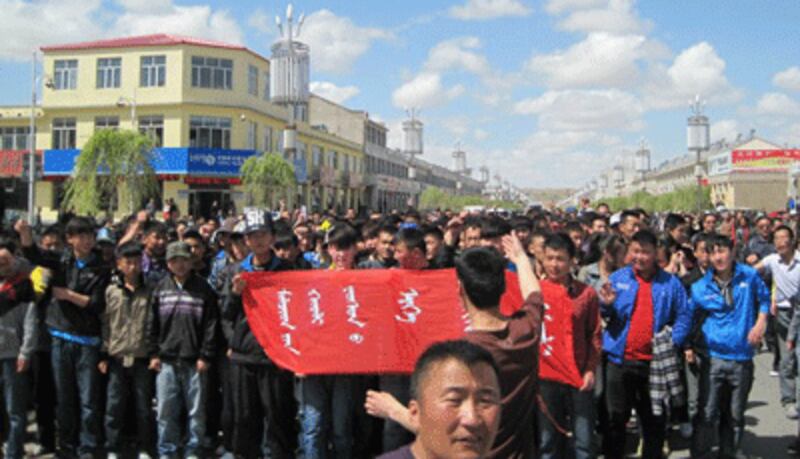Protests by ethnic Mongolians living in northern China spread across the region on Thursday, as thousands more took to the streets to demand protection of their rights following the death of a herder run over by a truck.
Protesters marched in Inner Mongolia's Hunveet Shar and Left Ujumchin banners, the equivalent of counties, on Thursday, according to the New York-based Southern Mongolian Human Rights Information Center (SMHRIC).
"Thousands more Mongolian herders and students took to the streets...to urge the Chinese authorities to respect the Mongolian herders' right to their land and right to maintain their traditional way of life," SMHRIC said in an e-mailed press release.
Protesters held banners and posters carrying the slogan "Defend the Rights of Mongols" and "Defend the Homeland" and marched towards the government buildings of their respective banners, it said.
Photos posted online and sent to RFA by participants showed a group of elementary school children among the protesters, holding a banner with the slogan "Protect our Grasslands." The children were later taken back to school by teachers, sources said.
"There were students and herders from the countryside on the streets," said one protester on Thursday. "The banners they carried called for the protection of the grasslands."
Ecosystem

The Chinese government has begun relocating more than 250,000 nomads from Inner Mongolia's grasslands in recent years, saying the move is necessary to protect the fragile ecosystem of the region.
The policy has been seen among ethnic Mongolians as further marginalization for Mongolian nomadic herders, who are already vastly outnumbered by Chinese peasants.
"There were more than 1,000 of us who left Xiwu banner together," the protester said. "But I daren't say much more than that because I think there aren't just going to be protests here today, but right across all the banners in the Xilinhot League."
Local officials said the government had already paid out nearly a million yuan (U.S.$154,000) in compensation to the family of Murgen, the man killed following clashes between Mongolian herders in Abag banner (in Chinese, Abagaqi) and mining company truck drivers.
Murgen's relatives only agreed to his cremation once the deal had been struck, sources said.
A Chinese Communist Party committee member from Murgen's home township of Haoletu said: "We thought the government's arrangements were okay, actually. The government has even paid compensation for the polluted grasslands."
"They also gave a million to Murgen's family, so as to resolve this issue, which was all settled on May 23 and 24," the official said.
Murgen's death on May 11 sparked protests by more than 2,000 students and herders in Xilinhot city on Wednesday.
They dispersed after officials promised to bring to justice the driver involved in the incident.
Mines shut
But the Haoletu official said he didn't know if the herders detained in the May 11 clashes had been freed.
"I don't really know about that," the official said. "That was done by the banner-level government. We are just the rural level of government."
He said the mines accused of polluting the grasslands had been opened last year. "They have been open for nearly a year now," the official said. "The mines have stopped operation now, and there are no more trucks."
But he said he didn't know whether they would stay shut.
"We rural herding people don't know much about what is going on," he said.
Protesters also called online Thursday for further protests in towns and cities in the herding district of Inner Mongolia.
Using online social networking tools like QQ and Facebook, Mongolians were invited to further gatherings in Alshaan Left Banner on Friday, Ordos city on Saturday, and Tongliao on Sunday, SMHRIC said.
A further protest was scheduled in Erenhot, on the border with Mongolia, on Monday, it said.
Nahubisgalat, an ethnic Mongolian Chinese national currently living in Japan, said Mongolians across the Xilinhot region would be watching to see what happens next.
"A lot of banners are likely to take part," he said. "It's not just a matter of one or two. This is likely to get bigger."
Organizing skills
He said there is a lot of resentment about development of the grasslands regions, and that herding families have been getting poorer and poorer.
"There is no organization here," he said. "People are just coming out onto the streets."
However, the protesters appeared to have learned from the nationwide crackdown on "Jasmine" rallies in major Chinese cities in recent months in the wake of uprisings in the Middle East. The Chinese rallies fizzled out as they attracted more police than participants.
According to New Zealand-based rights activist Wang Ning, who lived in the Xilinhot area for many years, the protesters were organizing themselves at the very last minute.
"They are being very, very secret about it, so that the authorities have no way to know," Wang said. "They don't put it on the Internet until the people have pretty much arrived [at the protest site.]"
"They also change arrangements at the last minute," he said. "They will say, today we are going to the government buildings, then they will show up at the television station, and walk to the government buildings."
Currently, ethnic Mongols represent a tiny 17 percent of the Inner Mongolia Autonomous Region’s 23 million people, the overwhelming majority of whom are Han Chinese.
Reported by Ding Xiao for RFA's Mandarin service, and by Dai Weisen for the Cantonese service. Translated and written in English by Luisetta Mudie.
